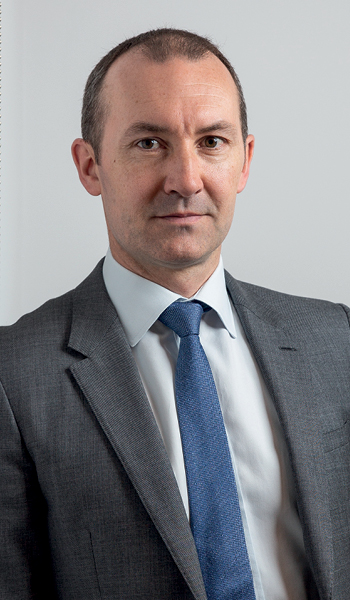

For investment professionals only
A style of income investing that reflects clients’ needs
Shining a light on the
Fidelity Global Dividend Fund
Sponsored by

MAY 2019


Introduction

Welcome to another edition of SOURCE, a publication that shines the spotlight on selected funds and their managers. This time, Fidelity presents its Global Dividend Fund. Find out more in our profile and Q&A with portfolio manager Dan Roberts plus independent supporting analysis from Citywire.
Introduction
Welcome to another edition of SOURCE, a publication that shines the spotlight on selected funds and their managers. This time, Fidelity presents its Global Dividend Fund. Find out more in our profile and Q&A with portfolio manager Dan Roberts plus independent supporting analysis from Citywire.

DAN ROBERTS
PORTFOLIO MANAGER,
FIDELITY GLOBAL DIVIDEND FUND


DAN
ROBERTS
PORTFOLIO MANAGER,
FIDELITY GLOBAL DIVIDEND FUND


Building
a resilient portfolio


Building
a resilient portfolio

An uncertain outlook for financial markets and the global economy is shining the spotlight on dividends as the most stable component of total returns from equities.
The source of those dividends matters too. A cautiously-managed, unconstrained global equity income fund has the ability to avoid the parts of the market that pose the greatest threat to dividend distributions.
Dan Roberts, portfolio manager of the Fidelity Global Dividend Fund, invests in resilient businesses with an emphasis on long-term income growth and capital preservation. Defensive and well diversified, the fund tends to hold up well in more volatile conditions, as well as aiming to deliver cross-cycle outperformance. With a focus on high quality, growing dividend streams, it is also designed to protect against rising inflation.
When thinking about future returns from global equity markets, Roberts breaks the sources of investment return into three components: yield, growth and valuation change. The sum of these three components gives an investor their total return.
In very good years, such as 2017, a positive return will come from all three components. Last year, however, rising US interest rates and the emergence of a more negative narrative around the health of the global economy caused stock markets around the world to lose ground despite positive contributions from company earnings and dividends.
‘While we’ve seen markets rebound quite strongly over the first quarter of the year – driven largely by a more dovish tone from the US Federal Reserve – it seems reasonable to assume we are entering a period of muted demand growth,’ said Roberts, who has run the fund since its launch in January 2012.
With corporate profit margins at all-time highs, Roberts believes it is prudent to focus on companies whose margins look defendable – whether that’s because they are simply less sensitive to the economic cycle or they have a clear opportunity to improve profits relative to the wider industry in which they operate (‘self-help’).
‘Currently we are seeing high valuations at a time when corporate profitability also looks stretched – so it makes sense to emphasise dividends as the most stable component of total return, and to do so by investing in assets that trade at an attractive yield struck off dividends that will be well supported across a range of economic scenarios,’ he said.
The portfolio aims to generate a sustainable stream of income that is at least 125% of the yield from the MSCI All Countries World index with less volatility than the benchmark.

Roberts is able to back the strongest income-paying opportunities regardless of where they are located across developed and emerging markets. He recognises the late-cycle environment makes growth prospects for dividends more muted overall, but points to notable differences across regions.
‘In geographies like the US and Japan, payout ratios are very low so the risk to dividends, I would argue, is low. In the US, more capital is currently allocated to share buybacks than dividends – so it will be the buybacks that get suspended before we can talk of a threat to the dividends,’ he said. ‘In Japan, dividend payout ratios are even lower than the US and Japanese corporates have the additional protection afforded by very strong balance sheets – over 50% of Japanese corporates currently have a net cash position.’
‘We are seeing high valuations at a time when corporate profitability also looks stretched – so it makes sense to emphasise dividends as the most stable component of total return.’
Dan Roberts
‘But in areas like Europe and the UK I think there’s much greater risk to dividend distributions, particularly in sectors or companies where balance sheets are stretched and they’re overdistributing – paying out more in dividends than they’re generating in cash. We’ve seen several dividend cuts from some quite high profile companies over the last 12 months and can probably expect a few more as we look forward.’
Roberts’ emphasis on the sustainability of dividends naturally leads him to prioritise quality characteristics when analysing his universe of 2,700 companies.
Chief among what he looks for in a potential investment is a simple and understandable business model, with a predictable and resilient earnings profile. The quality of the management team and their ability to allocate capital appropriately is also a key consideration.
‘Our quality bias is permanent not tactical – we believe it provides a significant advantage across a full market cycle,’ he said.
Alongside this quality bias is a strict valuation discipline. Roberts regards valuation as the single most important determinant of future returns so is careful to avoid overpaying for companies, however positive their prospects may seem. It is this combination of quality characteristics and valuation discipline which gives the portfolio a ‘margin of safety’ and preserves its ability to generate a stable and growing income stream.
The manager clearly has the courage of his convictions as the portfolio has an active share (divergence from the benchmark) of 92%. While concentrated, it also offers a good degree of diversification by region and by sector: the portfolio is comprised of 40 to 50 stocks, each accounting for between 1% and 4% of the fund’s assets.
Holdings at the bottom end of the range tend to be higher risk and higher potential return – more cyclical businesses or emerging market companies, for example, or those with a lower current yield and the potential for significant income growth.
Those at the top end of the range have a good total return outlook and are typically more stable businesses in developed markets or core income generators for the fund. The 4% limit guards against overconfidence and ‘black swan’ events – random or unexpected events that can harm even the ‘safest’ of stock-picks.
The portfolio’s exposures at present remain diversified but undeniably defensive. It also has a tilt towards industries that offer a higher return on capital – areas like healthcare, consumer staples, industrials and some sub-sectors of tech.

‘We like to invest in companies which have a high recurring element to their revenue base – consumables, subscription models or companies which provide a high service element to their offering. This gives us confidence that the cashflow they generate can support the dividend even if the broader economy is slowing,’ said Roberts, who has previous experience managing highly regarded equity income strategies for Aviva Investors and Gartmore.
Conversely, he has relatively small allocations to some traditional income-paying sectors such as telecoms and real estate where he deems the fundamentals unattractive. He also believes increased levels of corporate debt mean it is important to be selective in other defensive sectors, citing consumer staples companies such as Kraft Heinz, AB Inbev and British American Tobacco, as examples of companies where levels of debt look onerous. ‘Over the last decade a lot of debt has been taken on by traditional ‘defensives’ such as consumer staples. In some cases, this has compromised the investment case for us,’ he said.
The result is a portfolio that boasts a gross dividend yield of 3.3% – higher than the market without compromising on quality and sustainability.
‘We feel our strategy, which is focused on companies with earnings resilience, valuation support and strong balance sheets, yielding more than 3% with distributions growing by mid-single digits will serve investors well in a more volatile and uncertain environment,’ added Roberts.


SECTOR
OVERVIEW:
Mixed Asset

frank talbot
Head of Investment Research, CITYWIRE


SECTOR OVERVIEW:
Mixed Asset

frank talbot
Head of Investment Research, CITYWIRE


Trying to outperform global equities in the post-credit crisis period has been the toughest job in fund management, with just over a tenth of managers achieving this. This has been even more true in Equity – Global Equity Income where high yielding companies have lagged the broad MSCI AC World index considerably. Yet Fidelity’s Dan Roberts has achieved just this. His decision to move from a UK Income mandate to a global equity mandate when he switched from Gartmore to Fidelity in 2012 raised a few eyebrows, yet he has managed to more than double the average manager’s return over his full tenure and crucially adding value over and above the MSCI AC World index.

Our total return rankings consider all individual portfolio managers active at the beginning of a period and those at the end, with an unlimited number of career breaks during which time the average manager performance is substituted.
To appear in our risk-adjusted analysis a portfolio manager must have been managing a fund for 5/6 of the time frame under review and be active at the end of the period.

How does Dan stack up with his competition around the world?
The Fidelity Global Dividend fund is managed to deliver an attractive dividend-based total return with an emphasis on capital preservation. I aim to do this by investing in high-quality companies that we believe possess the strength and resilience to sustainably grow their dividends across a range of economic scenarios.
The fund is truly unconstrained and constructed from a blank sheet of paper without reference to the benchmark index. This translates into a portfolio with a very high active share and relatively low turnover, which looks and behaves very differently to the broader market.
We think this approach – taking some high-conviction views and holding them for the long term – will give us the best chance of success in terms of delivering returns in excess of the market over a full cycle.

AN UNCONSTRAINED INCOME STRATEGY


FUND MANAGER HOT-SEAT:
AN UNCONSTRAINED INCOME STRATEGY

TELL ME ABOUT YOUR INVESTMENT APPROACH. IN WHAT WAYS IS IT UNCONSTRAINED?
The Fidelity Global Dividend Fund is managed to deliver an attractive dividend-based total return with an emphasis on capital preservation. We aim to do this by investing in high-quality companies that we believe possess the strength and resilience to sustainably grow their dividends across a range of economic scenarios.
The fund is truly unconstrained – constructed from a blank sheet of paper without reference to the benchmark index. This translates into a portfolio with a very high active share and relatively low turnover, which looks and behaves very differently to the broader market.
We think this approach – taking high-conviction views and holding them for the long-term – will give us the best chance of success in terms of delivering returns in excess of the market over a
full cycle.
WHO IS ‘WE’? WHAT RESOURCES DO YOU HAVE TO DRAW UPON IN RUNNING THE FUND?
I have ultimate responsibility for selecting and sizing the stocks that satisfy my investment criteria, but I am supported by an extensive team. I’m one of six equity income portfolio managers and we each have a regional focus.
The breadth and depth of Fidelity’s research platform means there will always be a sufficient number of strong investment ideas to build a fully diversified portfolio at all points of the market cycle. Fidelity has one of the industry’s largest research operations with 129 equity research professionals located in eight locations, including 48 Asia Pacific ex Japan equity research analysts (as at 30th April 2019).
In line with a belief in fundamental research, in-depth company analysis forms the basis of analyst recommendations. Communication between analysts and portfolio managers is achieved using a combination of access to an online research database, the publication of daily research notes, voicemails, conference calls and face-to-face meetings.
WHO IS ‘WE’? WHAT RESOURCES DO YOU HAVE TO DRAW UPON IN RUNNING THE FUND?
Valuation discipline is key – we spend a lot of time and effort understanding and analysing the intrinsic value of companies before we are willing to invest.
However, it is important to recognise we do not simply invest in the highest yielding companies or those that look cheapest on a headline valuation multiple, such as a price-earnings (PE) metric. A high headline yield can often be a sign of stress in the underlying business and a precursor to a dividend cut.

We value businesses by taking a forward-looking view of cross-cycle cash generation. We also spend a lot of time on the balance sheet – something a traditional PE multiple tells you nothing about.
While we place significant emphasis on the price we are being asked to pay for a stock, we also demand certain characteristics from companies – such as a strong balance sheet, predictable cashflows and management that recognise the importance of good capital allocation – to help provide clarity over a stock’s true value and the sustainability of its earnings and dividend.
This results in an overall portfolio that is cheaper than the market on a dividend yield and free cashflow yield basis. However, we would argue that the quality of the assets in the fund is higher than the market, with more resilient return profiles and lower levels of debt.
The idea is that we build our clients’ wealth by compounding returns over a long investment horizon. We will maximise this compounding effect by avoiding significant drawdowns (losses) over discrete periods.

WHAT’S THE APPEAL OF A GLOBAL EQUITY FUND FOR INCOME INVESTORS? WHY IS IT IMPORTANT TO DIVERSIFY DIVIDENDS – ESPECIALLY AWAY FROM THE UK?
A global remit is beneficial as it allows us to look across a large and diverse universe of stocks and invest wherever we find a company that fits our criteria. This also provides attractive diversification benefits. Many single country equity income funds often face a challenge in that a large proportion of the index’s yield is concentrated in a relatively small number of sectors or even individual companies. However, by investing globally, we can ensure the fund has exposure to a selection of the best ideas balanced across industries and geographies.
WHERE ARE YOU FINDING THE BEST OPPORTUNITIES?
We are finding opportunities across the market, but the fund’s positioning has a clear defensive tilt today. This is because we generally don’t see much valuation support in some of the more cyclical sectors if/when margins and cashflows normalise.
The largest stock in the fund today is German exchange group Deutsche Boerse, which has structural growth tailwinds but will also benefit from any uptick in market volatility and/or interest rates. We have positions in several consumer staples companies such as Procter & Gamble, Colgate and Diageo, healthcare companies such as Roche and publishing businesses such as Wolters Kluwer.
There are also pockets of cyclicality in the fund, such as Taiwan Semiconductor and recent addition Informa. Informa is the leading global events and exhibitions business. We bought it following a severe sell-off in the shares during Q4 2018.
WHAT HAS THE FUND’S PERFORMANCE BEEN LIKE? WHAT’S BEEN THE MAIN DRIVER OF THIS?
The fund’s long-term performance has been strong, despite a challenging backdrop for value-conscious income investors. We look at performance not only from the point of view of capital growth, but also our ability to limit drawdown in challenging markets and consistently grow our income distributions. These outcomes form the core of our proposition to clients.
We have delivered growth ahead of the market and peer group average since launch, while exhibiting lower volatility and continuous growth in income distributions. This has been achieved despite a stylistic underweight to two of the best performing parts of the market – US equities and technology companies.
Our performance has been driven primarily by good stock selection. We have identified companies such as Wolters Kluwer and Deutsche Boerse that have delivered growth despite an initially sceptical market view, which allowed us to buy these great companies at attractive valuations. A key factor to our success has also been our ability to navigate risk and avoid some of the worst performing stocks in the market.
IMPORTANT INFORMATION
This information is for investment professionals only and should not be relied upon by private investors. The value of investments and any income from them can go down as well as up so the client may get back less than they invest. Investors should note that the views expressed may no longer be current and may have already been acted upon. Reference in this document to specific securities should not be interpreted as a recommendation to buy or sell these securities, but is included for the purposes of illustration only. Past performance is not a reliable indicator of future returns. As a result of the annual management charge for the income share class being taken from capital, the distributable income may be higher but the fund’s capital value may be eroded, which will affect future performance. The Fidelity Global Dividend Fund can use financial derivative instruments for investment purposes, which may expose it to a higher degree of risk and can cause investments to experience larger than average price fluctuations. Changes in currency exchange rates may affect the value of an investment in overseas markets. This fund invests in emerging markets which can be more volatile than other more developed markets. Investments should be made on the basis of the current prospectus, which is available along with the Key Investor Information Document and current and semi-annual reports, free of charge on request, by calling 0800 368 1732. Issued by Financial Administration Services Limited and FIL Pensions Management, authorised and regulated by the Financial Conduct Authority. Fidelity, Fidelity International, the Fidelity International logo and F symbol are trademarks of FIL Limited. UKM0519/24020/SSO/NA
CITYWIRE INVESTMENT WARNING
This communication is by Citywire Financial Publishers Ltd (“Citywire”) and is provided in Citywire’s capacity as financial journalists for general information and news purposes only. It is not (and is not intended to be) any form of advice, recommendation, representation, endorsement or arrangement by Citywire or an invitation to invest or an offer to buy, sell, underwrite or subscribe for any particular investment. In particular, the information provided will not address your particular circumstances, objectives and attitude towards risk.
Any opinions expressed by Citywire or its staff do not constitute a personal recommendation to you to buy, sell, underwrite or subscribe for any particular investment and should not be relied upon when making (or refraining from making) any investment decisions. In particular, the information and opinions provided by Citywire do not take into account your personal circumstances, objectives and attitude towards risk.
Citywire uses information obtained primarily from sources believed to be reliable (such as company reports and financial reporting services) however Citywire cannot guarantee the accuracy of information provided, or that the information will be up-to-date or free from errors. Investors and prospective investors should not rely on any information or data provided by Citywire but should satisfy themselves of the accuracy and timeliness of any information or data before engaging in any investment activity. If in doubt about a particular investment decision an investor should consult a regulated investment advisor who specialises in that particular sector.
Information includes but is not restricted to any video, article or guide content created or provided by Citywire.
For your information we would like to draw your attention to the following general investment warnings:
The price of shares and investments and the income associated with them can go down as well as up, and investors may not get back the amount they invested. The spread between the bid and offer prices of securities can be significant in volatile market conditions, especially for smaller companies. Realisation of small investments may be relatively costly. Some investments are not suitable for unsophisticated or non-professional investors. Appropriate independent advice should be obtained before making any such decision to buy, sell, underwrite or subscribe for any investment and should take into account your circumstances and attitude to risk.
Past performance is not necessarily a guide to future performance. Citywire Financial Publishers Ltd. is authorised and regulated by the Financial Conduct Authority (no: 222178).
TERMS OF SERVICE
Citywire Source is owned and operated by Citywire Financial Publishers Ltd (“Citywire”). Citywire is a company registered in England and Wales (company number 3828440), with registered office at 1st Floor, 87 Vauxhall Walk, London, SE11 5HJ and is authorised and regulated by the Financial Conduct Authority (no: 222178) to provide investment advice and is bound by its rules.
1. Intellectual Property Rights 1.1 We are the owner or licensee of all copyright, trademarks and other intellectual property rights in and to these works (including all information, data and graphics in them) (collectively referred to as “Content”). You acknowledge and agree that all copyright, trademarks and other intellectual property rights in this Content shall remain at all times vested in Citywire and /or its licensors. 1.2 This Content is protected by copyright laws and treaties around the world. All such rights are reserved. Images and videos used on our websites are © iStockphoto, Alamy, Thinkstock, Topfoto, Getty Images or Rex Features (among others). For credit information relating to specific images where not stated, please contact picturedesk@citywire.co.uk. 1.3 You must not copy, reproduce, modify, create derivative works from, transmit, distribute, publish, summarise, adapt, paraphrase or otherwise publicly display any Content without the specific written consent of a director of Citywire. This includes, but is not limited to, the use of Citywire content for any form of news aggregation service or for inclusion in services which summarise articles, the copying of any Fund manager data (career histories, profile, ratings, rankings etc) either manually or by automated means (“scraping”). Under no circumstance is Citywire content to be used in any commercial service.
2. Non-reliance 2.1 You agree that you are responsible for your own investment decisions and that you are responsible for assessing the suitability and accuracy of all information and for obtaining your own advice thereon. You recognise that any information given in this Content is not related to your particular circumstances. Circumstances vary and you should seek your own advice on the suitability to them of any investment or investment technique that may be mentioned. 2.2 The Fund manager performance analyses and ratings provided in this Content are the opinions of Citywire as at the date they are expressed and are not recommendations to purchase, hold or sell any investment or to make any investment decisions. Citywire’s opinions and analyses do not address the suitability of any investment for any specific purposes or requirements and should not be relied upon as the basis for any investment decision. 2.3 Persons who do not have professional experience in participating in unregulated collective investment schemes should not rely on material relating to such schemes. 2.4 Past performance of investments is not necessarily a guide to future performance. Prices of investments may fall as well as rise.
2.5 Persons associated with or employed by Citywire may hold positions or take positions in investments referred to in this publication. 2.6 Citywire Financial Publishers Ltd operate a policy of independence in relation to matters where the operators may have a material interest or conflict of interest.
3. Limited Warranty 3.1 Neither Citywire nor its employees assume any responsibility or liability for the accuracy or completeness of the information contained on our site. 3.2 You acknowledge and agree that any information that you receive through use of the site is provided “as is” and “as available” basis without representation or endorsement of any kind and is obtained at your own risk. 3.3 To the maximum extent permitted by law, Citywire excludes all representations, warranties, conditions or other terms, whether express or implied (by statute, common law, collaterally or otherwise) in relation to the site or otherwise in relation to any Content or Feed, including without limitation as to satisfactory quality, fitness for particular purpose, non-infringement, compatibility, accuracy, or completeness. 3.4 Notwithstanding any other provision in these Terms, nothing herein shall limit your rights as a consumer under English law.
4. Limitation of Liability To the maximum extent permitted by law, Citywire will not be liable in contract, tort (including negligence) or otherwise for any liability, damage or loss (whether direct, indirect, consequential, special or otherwise) incurred or suffered by you or any third party in connection with this Content, or in connection with the use, or results of the use of Content. Citywire does not limit liability for fraudulent misrepresentation or for death or personal injury arising from Citywire’s negligence.
5. Jurisdiction These Terms are governed by and shall be construed in accordance with the laws of England and the English courts shall have exclusive jurisdiction in the event of any dispute in connection with this Content or these Terms.






